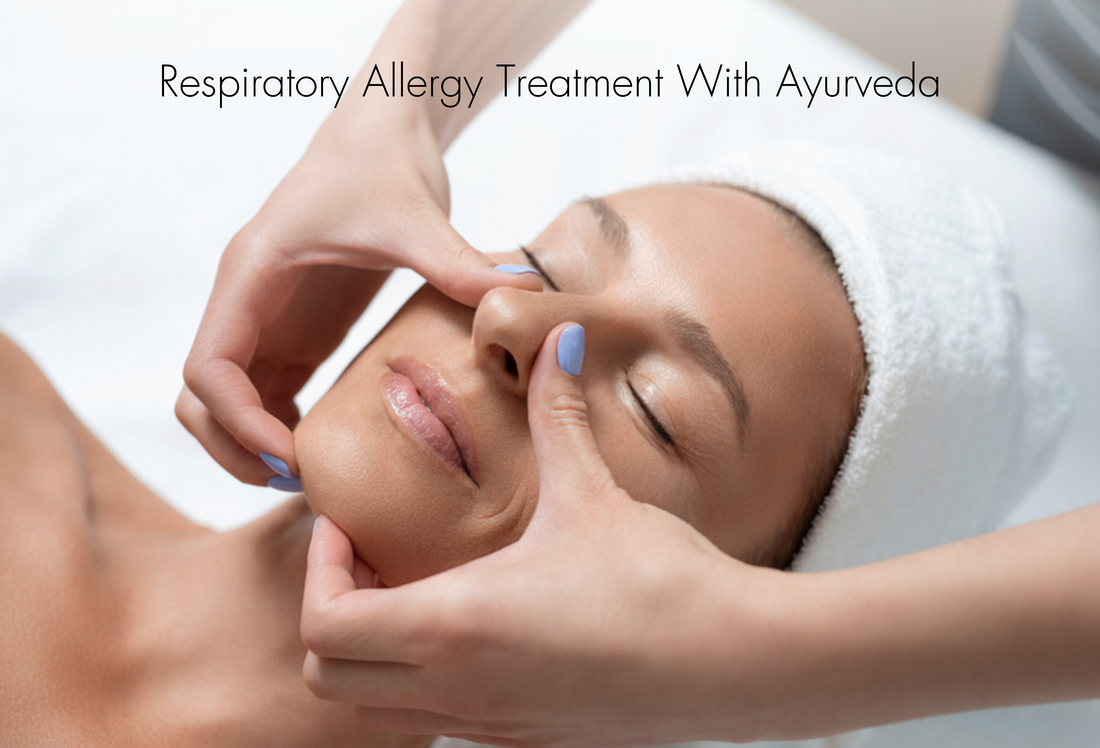
Tratamiento de alergias respiratorias con Ayurveda
Introducción:
¿Alguna vez te has despertado estornudando constantemente? ¿Sufres de goteo nasal, estornudos y dificultad para respirar al exponerte al polvo, polen y otras sustancias? Estas son solo algunas de las alergias respiratorias más comunes que muchas personas padecen. Si tu sistema inmunitario desencadena una reacción alérgica por error, eres propenso a sufrir alergias respiratorias. Estas son consecuencia de un sistema inmunitario debilitado, una mala nutrición y un intestino dispéptico. Analicemos ahora el tratamiento para las alergias respiratorias y su alivio.
Alergias respiratorias frecuentes:
Las alergias respiratorias son causadas por varias razones, entre ellas:
- Polen de pastos, malezas y árboles
- Esporas de moho y ácaros del polvo
- caspa de mascotas
- Humo y contaminación
- Variaciones estacionales
Síntomas de alergia respiratoria:
Las diferencias individuales en los síntomas son comunes; sin embargo, pueden incluir:
- Estornudos y secreción nasal
- Ojos húmedos y con picazón
- Opresión en el pecho
- Tos y sibilancias
- Falta de aliento
La función del sistema inmunitario en las alergias respiratorias:
-
Un sistema inmunológico fuerte es esencial para evitar respuestas alérgicas:
En Ayurveda se hace hincapié en el desarrollo de la inmunidad con medicamentos, una dieta equilibrada y buenos estilos de vida.
-
Cómo se fortalece la inmunidad mediante el Ayurveda:
Las hierbas utilizadas en la medicina Ayurveda, como Amla y Ashwagandha, fortalecen las defensas del cuerpo contra infecciones y alergias.
-
Rasayana: El arte del rejuvenecimiento:
Los tratamientos de Rasayana favorecen la longevidad, la renovación de tejidos y mejoran el rendimiento del sistema inmunológico.
Alergias respiratorias: ¿cómo se ven en Ayurveda?
Con una historia de 3.000 años, el Ayurveda sostiene que las alergias respiratorias son provocadas por un sistema inmunológico comprometido y un desequilibrio en los doshas del cuerpo, Pitta, Kapha y Vata.
Según el Ayurveda, las alergias son un signo de inmunidad débil, mala digestión y acumulación de toxinas (ama) en el cuerpo. Para empezar a tratar los síntomas, se desintoxica el cuerpo y se equilibran los doshas.
Doshas y la salud de tu respiración:
El sistema respiratorio está influenciado por cada dosha y un desequilibrio puede provocar ciertas reacciones alérgicas.
-
Desproporción de Vata:
Un desequilibrio vata produce un tracto respiratorio seco y frío, lo que puede provocar sibilancia, tos seca y disnea.
-
El desequilibrio de Kapha:
La secreción nasal y la opresión en el pecho son signos comunes de un desequilibrio de Kapha, que también causa acumulación de moco, congestión e infecciones de los senos nasales.
-
Desproporción de Pitta:
La inflamación en el sistema respiratorio, que produce síntomas como dolores de cabeza sinusales, sensación de ardor en las fosas nasales e irritación, puede ser causada por un desequilibrio de Pitta.
Consejos de un estilo de vida ayurvédico para evitar las alergias respiratorias:
-
Yoga para una respiración más saludable:
La respiración y la capacidad pulmonar se mejoran con posturas de yoga como Dhanurasana (postura del arco) y Bhujangasana (postura de la cobra).
-
Ejercicios de respiración Pranayama:
Pranayama, particularmente Anulom Vilom y Kapalbhati, ayuda a mejorar la función pulmonar, aumentar la ingesta de oxígeno y eliminar obstrucciones nasales.
-
Reducción del estrés y meditación:
Las alergias pueden empeorar con el estrés. La meditación frecuente puede ayudar a reducir los brotes de alergia al calmar la mente.
Tratamiento para las alergias respiratorias en Ayurveda:
Para combatir estos síntomas, necesita un plan integral. Este plan identifica la causa raíz y establece diferentes tratamientos para las alergias respiratorias. El programa de atención para alergias respiratorias de Sevayu Cuba utiliza antiguos conocimientos ayurvédicos para crear soluciones personalizadas para sus problemas de salud. En este centro de bienestar ayurvédico , expertos revisan su salud general antes de tratar sus alergias respiratorias.
Nuestro programa se centra principalmente en el tratamiento de las alergias respiratorias mediante la medicina herbal. Seleccionamos nuestros tratamientos herbales con cuidado. Estos reducen la irritación respiratoria y las molestias causadas por las alergias. A menudo los combinamos con terapias de masaje relajantes. Estos tratamientos para las alergias respiratorias contienen la esencia natural de las hierbas. Esto, combinado con la terapia, brinda un resultado potente y refrescante.
Remedio herbal para las alergias del sistema respiratorio:
Las hierbas del Ayurveda son bastante útiles para tratar las alergias respiratorias y promover la salud pulmonar en general.
- Tabletas de albahaca sagrada o tulsi: las potentes propiedades antiinflamatorias y antibacterianas de las tabletas de albahaca sagrada o tulsi ayudan a limpiar las vías respiratorias y a disminuir los síntomas de la alergia.
- Polvo de regaliz de raíz o mulethi: el polvo de regaliz es un gran tratamiento para las reacciones alérgicas en los pulmones, ya que calma las vías respiratorias irritadas y reduce la inflamación.
- Pimienta larga o Peepali: la tableta de Peepali favorece la salud respiratoria, mejora la función pulmonar y elimina el exceso de mucosidad.
¿Por qué elegir Sevayu Cuba?
El programa de Cuidado Respiratorio para Alergias de Sevayu Cuba te preparará para un bienestar respiratorio duradero. Vive una vida sin alérgenos respiratorios y respira. Sevayu Cuba está listo para ayudarte en tu camino hacia la sanación natural.
Para obtener aún más detalles, reserve su sesión hoy y sienta la diferencia entre Ayurveda y el rejuvenecimiento con nosotros.
|
Paquete |
Duración |
Alojamiento |
Comidas |
Consultas |
|
Cuidado respiratorio alérgico |
7 días y 14 días |
Habitación grande con 2 camas queen |
3 comidas al día |
Consultas pre y post ayurvédicas con médicos para garantizar que se sigan las pautas de salud. |
Si está interesado en algo similar, le recomendamos leer nuestra guía sobre tratamientos ayurvédicos efectivos para la sinusitis crónica en EE. UU.
Remedios caseros naturales para las alergias respiratorias :
Uso de aceites esenciales en la inhalación de vapor:
- La respiración se vuelve más fácil y los senos paranasales se despejan cuando se inhala vapor infundido con aceite de menta o eucalipto.
Infusiones de hierbas para ayudar con la respiración:
- Los tés infusionados con hinojo, jengibre y aceite de menta alivian la garganta y disminuyen la producción de moco.
- Miel y cúrcuma para calmar la garganta Puedes tomar una mezcla de miel y cúrcuma todos los días para calmar la garganta y reducir la tos.
Conclusión:
El tratamiento para alergias respiratorias es un tratamiento natural y eficaz que consiste en equilibrar los doshas del cuerpo y abordar la causa subyacente, lo cual se logra mediante el Ayurveda. Puede mejorar su salud respiratoria y vivir una vida libre de alergias mediante el uso de hierbas medicinales, métodos de depuración y cambios en el estilo de vida.
Preguntas frecuentes (FAQ):
1. ¿Cuánto tiempo tardan en empezar a mostrar resultados las alergias respiratorias tratadas con Ayurveda?La eficacia de la terapia ayurvédica varía según el grado de alergia; los resultados pueden verse después de algunas semanas.
2. ¿Las alergias respiratorias son totalmente curables con remedios ayurvédicos?
Si bien el Ayurveda puede reducir en gran medida los síntomas y mejorar la salud respiratoria, el tratamiento de las alergias puede requerir ajustes continuos en el estilo de vida.
3. ¿Los medicamentos para las alergias respiratorias son seguros para todas las personas que tienen problemas respiratorios?
Sí, normalmente es seguro, pero especialmente para personas con enfermedades preexistentes, debe tomarse bajo la supervisión de un médico ayurvédico capacitado.
4. En Ayurveda, ¿cómo afecta la nutrición a las alergias en el sistema respiratorio?
Reducir los alimentos que producen moco y equilibrar los doshas en la dieta mejorará en gran medida la salud respiratoria y disminuirá los síntomas de la alergia.
5. ¿Pueden los niños con alergias respiratorias beneficiarse de los tratamientos ayurvédicos?
Muchos tratamientos ayurvédicos son seguros para los niños, pero aun así debes consultar a un médico ayurvédico para obtener asesoramiento sobre la dosis.

